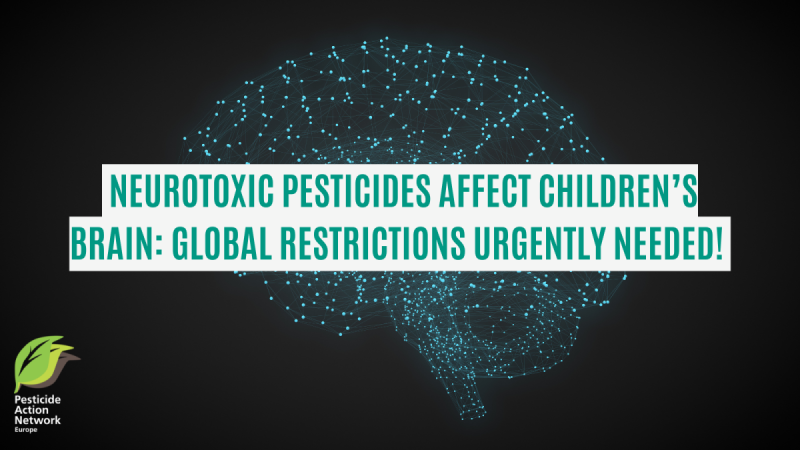The EU recently took an important step to lower the permitted levels of the neurotoxic pesticide acetamiprid in our food. A review protocol initiated could lead to a complete ban of this dangerous insecticide. These decisions follow a letter from PAN Europe. We warn that studies show acetamiprid and other neonicotinoids are not only toxic to bees and birds, but also pose serious risks to human health and especially to young children.
During the September meeting of the Standing Committee on Plants, Animals, Food and Feed (SCoPAFF), EU Member States agreed to invoke Article 21 of the pesticide regulation. This allows the withdrawal of active substances from the market if new evidence reveals harmful effects. As PAN Europe has been warning, recent scientific studies show that neonicotinoids like acetamiprid can cause cancer, endocrine disruption, infertility, and harm to the unborn child. Recent studies detected acetamiprid in umbilical cords, breast milk and even in children's cerebrospinal fluid in the brain. This is particularly alarming, as acetamiprid affects neurological development and can seriously impact children's brain health in a manner similar to nicotine.
After PAN Europe raised concerns about neurotoxic pesticides many times (1, 2, 3, 4), the European Commission issued a mandate to the European Food Safety Authority (EFSA) to analyse the data. In May this year EFSA concluded that it was necessary to lower the maximum residues allowed in food for acetamiprid, as its effects on neurons were observed even at low concentrations. In September we urged the SCoPAFF members to vote for the proposal to do so. (5)
Regulatory system fails
Neonicotinoids are not only very harmful to insects, especially bees. They also seriously affect birdlife, as was proven in the recent meta-analysis ‘Neonicotinoids Impact All Aspects of Bird Life’. (6)
The impacts on human health indicated above prove that the initial statement by industry that this class of pesticides has a unique action on insects alone is far from the truth. However, they were allowed on the market for many years since their first approval in the 90's and have contributed to the collapse of biodiversity. We now also know that they have a serious negative impact on human health. This is one more example of the weakness of our regulatory system: it completely failed to protect health and biodiversity, as in so many cases before.
Call for immediate retraction of Acetamiprid and all neurotoxic pesticides
PAN Europe believes that the findings, from both the scientific community and EFSA, should lead to the immediate withdrawal of acetamiprid. Moreover, we urge regulators to take action against all neurotoxic pesticides, particularly given the rise in pesticide-related neurological diseases such as autism and Parkinson's in the EU.
PAN Europe's action on acetamiprid is part of a broader effort to better prevent citizens and the environment from being harmed by neurotoxic pesticides. Indeed, we have called on the Commission to implement more sensitive neurodevelopmental toxicity tests as part of pesticide risk assessments, in line with OECD guidelines. Scientific studies also show us that similar action is needed against other neonicotinoids that are still on the market, both as pesticides and also as biocide used for example in flea treatment of pets. EFSA should conduct an urgent comprehensive assessment of all scientific evidence regarding the neurotoxicity of imidacloprid, acetamiprid, thiamethoxam, clothianidin, thiacloprid, flupyradifurone, and sulfoxaflor.
Concerns about EFSA stimulating industry-friendly but ineffective test methods
While we welcome the steps taken so far, we have also identified that the neurotoxicity issue does not receive the urgent attention it needs. The way EFSA tries to introduce industry friendly but ineffective test methods to determine if a pesticide has neurotoxic properties raises serious concerns among neurotoxicity and Parkinson’s specialists, as was highlighted in this article.
Notes:
(1) Neurotoxicity of Pesticides, Parkinsons, letter to EU Commissioner Kyriakides 25 February 2022
(2) Neonicotinoid insecticide residues in children cerebrospinal fluids, letter to EU Commissioner Kyriakides, 15 April 2022
(3) No safe dose for the unborn, letter to EU Commissioner Kyriakides, 8 December 2022
(4) Neurotoxicity of Pesticides, letter to EU Commissioner Kyriakides 8 June 2023
(5) Call by PAN Europe on SCoPAFF members to endorse the new ADI and ARfD values of acetamiprid and to support the Commission’s proposal to adjust its MRLs, 18 Sep 2024
